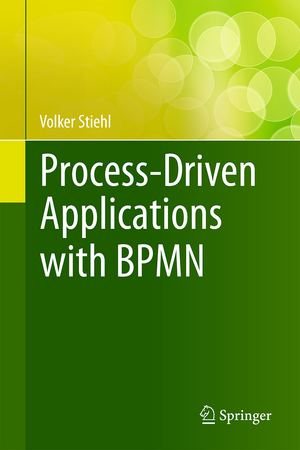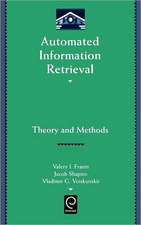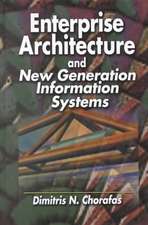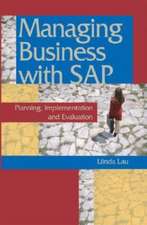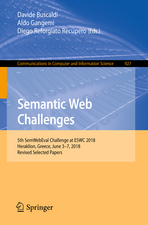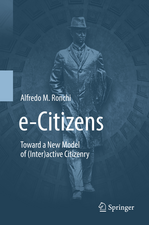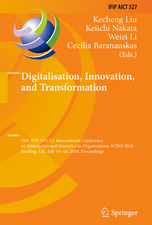Process-Driven Applications with BPMN
Autor Volker Stiehlen Limba Engleză Hardback – 29 sep 2014
The book presents an approach for implementing an architecture for applications that strives to find a balance between development and maintenance costs, sustainability, scalability and fault tolerance; that meets flexibility requirements without becoming inordinately complex itself; and that keeps the end application as abstract as possible from the system landscape in which it operates. Based on the semantic enhancements found in version 2.0 of the BPMN standard, which have made it possible to execute process models, his approach exploits BPMN to create and run complete application architectures. In this context, BPMN is not just used to model the business processes of the application, as the “B” in BPMN might suggest; but also to model and execute the integration processes between the systems. Throughout the book, the software package SAP Process Orchestration is used to illustrate the implementation of the proposed architecture, yet all recommendations are intentionally kept generic so that they can be implemented on any other comparable platform as well.
Software architects, IT managers, software developers and project managers, as well as students of information and business technology will find the book a valuable resource. The proposed application architecture offers them a detailed blueprint, the principles of which they can use to plan and implement process-driven distributed applications.
| Toate formatele și edițiile | Preț | Express |
|---|---|---|
| Paperback (1) | 311.22 lei 38-44 zile | |
| Springer International Publishing – 23 aug 2016 | 311.22 lei 38-44 zile | |
| Hardback (1) | 483.93 lei 6-8 săpt. | |
| Springer International Publishing – 29 sep 2014 | 483.93 lei 6-8 săpt. |
Preț: 483.93 lei
Preț vechi: 604.92 lei
-20% Nou
Puncte Express: 726
Preț estimativ în valută:
92.60€ • 97.13$ • 77.09£
92.60€ • 97.13$ • 77.09£
Carte tipărită la comandă
Livrare economică 01-15 aprilie
Preluare comenzi: 021 569.72.76
Specificații
ISBN-13: 9783319072173
ISBN-10: 331907217X
Pagini: 334
Ilustrații: XVII, 334 p. 221 illus.
Dimensiuni: 155 x 235 x 25 mm
Greutate: 0.67 kg
Ediția:2014
Editura: Springer International Publishing
Colecția Springer
Locul publicării:Cham, Switzerland
ISBN-10: 331907217X
Pagini: 334
Ilustrații: XVII, 334 p. 221 illus.
Dimensiuni: 155 x 235 x 25 mm
Greutate: 0.67 kg
Ediția:2014
Editura: Springer International Publishing
Colecția Springer
Locul publicării:Cham, Switzerland
Public țintă
Professional/practitionerCuprins
Introduction.- Definition of Process-Driven Applications.- Architecture of Process-Driven Applications.- Implementing the Basic Architecture of Process-Driven Applications.- Advanced Concepts for Architecture Support in Process-Driven Applications.- Conclusion and Outlook.
Notă biografică
Dr. Volker Stiehl studied computer science at the Friedrich-Alexander-University of Erlangen-Nuremberg. After 12 years as developer and consultant at Siemens, he joined SAP in 2004. As Chief Product Expert, Volker is currently a member of the product management team for SAP Net Weaver Process Integration, SAP's reliable/high performance SOA middleware product for system integrations. Volker is a regular speaker at various national and international conferences and also a lecturer at the University of Erlangen-Nuremberg and the Baden-Wuerttemberg Cooperative State University Mosbach.
Textul de pe ultima copertă
How can we optimize differentiating business processes and exploit their full potential? Here Volker Stiehl provides answers, utilizing the various options that the BPMN (Business Process Model and Notation) standard offers for planning, implementing, and monitoring processes.
The book presents an approach for implementing an architecture for applications that strives to find a balance between development and maintenance costs, sustainability, scalability, and fault tolerance; that meets flexibility requirements without becoming inordinately complex itself; and that keeps the end application as abstract as possible from the system landscape in which it operates. Based on the semantic enhancements found in version 2.0 of the BPMN standard, which have made it possible to execute process models, his approach exploits BPMN to create and run complete application architectures. In this context, BPMN is not just used to model the business processes of the application, as the “B” in BPMN might suggest; but also to model and execute the integration processes between the systems. Throughout the book, the software package SAP Process Orchestration is used to illustrate the implementation of the proposed architecture, yet all recommendations are intentionally kept generic so that they can be implemented on any other comparable platform as well.
Software architects, IT managers, software developers and project managers, as well as students of information and business technology will find the book a valuable resource. The proposed application architecture offers them a detailed blueprint, the principles of which they can use to plan and implement process-driven distributed applications.
The book presents an approach for implementing an architecture for applications that strives to find a balance between development and maintenance costs, sustainability, scalability, and fault tolerance; that meets flexibility requirements without becoming inordinately complex itself; and that keeps the end application as abstract as possible from the system landscape in which it operates. Based on the semantic enhancements found in version 2.0 of the BPMN standard, which have made it possible to execute process models, his approach exploits BPMN to create and run complete application architectures. In this context, BPMN is not just used to model the business processes of the application, as the “B” in BPMN might suggest; but also to model and execute the integration processes between the systems. Throughout the book, the software package SAP Process Orchestration is used to illustrate the implementation of the proposed architecture, yet all recommendations are intentionally kept generic so that they can be implemented on any other comparable platform as well.
Software architects, IT managers, software developers and project managers, as well as students of information and business technology will find the book a valuable resource. The proposed application architecture offers them a detailed blueprint, the principles of which they can use to plan and implement process-driven distributed applications.
Caracteristici
Explains in detail how to exploit the full functionality of BPMN 2.0 to model and execute cross-organizational differentiating processes Describes precisely how to preserve the business BPMN model during implementation Uses SAP Process Orchestration to illustrate the implementation of the architecture framework Ideally combines academic findings, sound standards and professional experiences Includes supplementary material: sn.pub/extras
